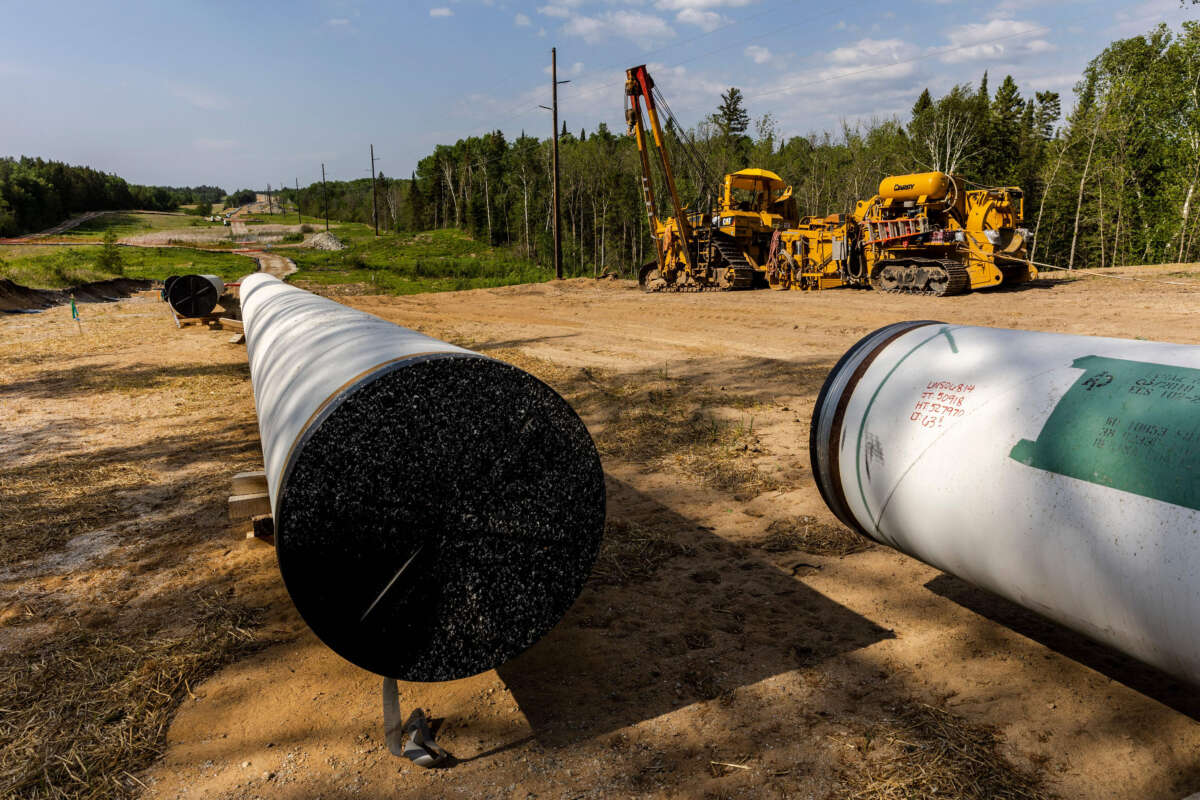Honest, paywall-free news is rare. Please support our boldly independent journalism with a donation of any size.
The Canadian oil company Enbridge has been ordered to pay the Bad River Band of Lake Superior Chippewa $5 million in damages for trespassing and to gradually shut down part of its Line 5 pipeline in Wisconsin after a federal judge found that the company has placed the tribe’s sacred land at risk of an environmental disaster.
U.S. District Judge William Conley of the Western District of Wisconsin handed down the ruling on Friday after the Bad River Band argued in court that there are now fewer than 15 feet between parts of Line 5 and the Bad River following the partial erosion of the riverbank in recent months.
The tribe said its land is in imminent danger of a potential pipeline rupture as roughly 12 miles of Line 5 run through the Bad River Band’s reservation, carrying up to 23 million gallons of oil and liquefied natural gas each day through Michigan and Wisconsin to Ontario.
Line 5 has been the site of about 30 oil spills in its 70-year history, and another of Enbridge’s pipelines ruptured in 2010, spilling more than 840,000 gallons of oil into a creek and the Kalamazoo River in Michigan.
In addition to ordering Enbridge to pay the tribe, Conley on Friday gave the company three years to wind down its operations on the Bad River Band’s land, ordering it to “cease operation of Line 5 on any parcel within the band’s tribal territory on which defendants lack a valid right of way and to arrange reasonable remediation at those sites.”
The judge denied, however, that the pipeline’s presence has put the tribe in imminent danger. He said an oil spill “would unquestionably be a public nuisance” but claimed an immediate shutdown of a portion of the pipeline would disrupt energy security and cause fuel costs to soar for locals.
Bad River Band Chairman Mike Wiggins said the tribe does not see the ruling as “cause for unqualified celebration” but expressed appreciation for the judge “putting an end to Enbridge’s flagrant trespass and disregard for our rights.”
“Tribal sovereignty prevailed over corporate profits,” Wiggins said, adding that the tribe expects Enbridge “to fight this order with all of their corporate might.”
“We are under no illusion that Enbridge will do the right thing,” he added.
Enbridge said over the weekend that it plans to appeal the ruling.
Erick Arnold, an attorney for the Bad River Band, said the three-year timeline leaves the tribe “vulnerable to catastrophe.”
“While the band’s motivations have never been about money,” said Arnold, “such a small award for a decadelong trespass during which Enbridge earned over a billion dollars in net profits from Line 5 will not sufficiently deter trespassers like Enbridge, but will instead create an incentive for corporations to violate the sovereignty of the band.”
Environmental lawyer and activist Steven Donziger called the order a “victory” overall.
“But for the theft of Indigenous lands,” he said, “this pipeline would not even exist.”
Speaking against the authoritarian crackdown
In the midst of a nationwide attack on civil liberties, Truthout urgently needs your help.
Journalism is a critical tool in the fight against Trump and his extremist agenda. The right wing knows this — that’s why they’ve taken over many legacy media publications.
But we won’t let truth be replaced by propaganda. As the Trump administration works to silence dissent, please support nonprofit independent journalism. Truthout is almost entirely funded by individual giving, so a one-time or monthly donation goes a long way. Click below to sustain our work.
